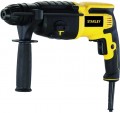Impact energy
The energy transmitted by the perforator to the material being processed upon impact; the higher this indicator, the stronger and more powerful each individual blow.
First of all, we recall that the energy of impacts is directly related to their frequency: an increase in frequency leads to a decrease in energy. Therefore, for models where the number of strokes can be adjusted, this paragraph usually gives the maximum energy achieved at the minimum speed of operation.
In general, higher impact energy improves efficiency when working with hard, stubborn materials, but requires more motor power (especially if it has to be combined with a high frequency). Therefore, it is worth choosing according to this parameter, taking into account specific tasks. So, for occasional use in everyday life, an energy of 2 J or less is enough, for home repair work of medium intensity, at least 3 J is desirable; a power of
4 J or more is already considered high; and in some industrial-grade perforators, this figure can reach 30 J.
Number of thrusts
The number of beats per minute provided by the punch. For models in which the beat frequency can be adjusted, this item indicates the entire adjustment range, for example "1600 — 3000".
High impact frequency, on the one hand, increases the productivity of the tool and can significantly reduce the time required for work. On the other hand, with the same engine power, an increase in the number of strokes per minute leads to a decrease in the energy of each stroke. Therefore, among heavy performant devices, a low frequency is often found — up to 2500 beats / min and even lower. And the ability to adjust the frequency of impacts allows you to adjust the hammer to the specific situation, depending on what is more important — productivity or the ability to cope with hard, stubborn material. For example, for old crumbling brickwork, you can set the speed higher, and for working with stone or dense concrete, it is better to reduce the frequency of impacts by directing engine power to increase the energy of each impact.
Summing up, we can say this: when choosing a perforator, you should focus on both the number of strokes and the impact energy. Detailed recommendations on this subject for specific situations can be found in special sources.
Rotation speed
The speed of rotation of the working equipment provided by the rotary hammer. Usually, this indicates the speed at idle, without load; rated load speeds can be further specified in the characteristics (see below), but this is rare, and this parameter is still considered the main characteristic. It is also worth mentioning that in the presence of a speed controller (see "Functions"), the maximum speed value is given here.
When working in the main mode — drilling with impact — the rotation of the equipment is used mainly to remove waste from the hole, and the revolutions here are of no fundamental importance (they can be very low). Therefore, it is worth paying attention to this indicator mainly in cases where the rotary hammer is planned to be often used for conventional drilling, without impact. And here it is worth proceeding from the fact that
high speeds increase productivity and contribute to accuracy when working with some materials, but reduce torque (compared to tools with the same engine power). So for heavy work with hard, stubborn materials, relatively "slow" tools are usually better suited.
Note also that drilling is not the main task of rotary hammers; therefore, their rotation speeds are noticeably lower than those of the same
drills. On the other hand, in this case, low speeds are often compensated by powerful engines and high torque, which makes it possible to effectively drill holes
...of a fairly large diameter, including using crowns.Power cord length
Power cord length for mains powered drills (see above). The
longer the cord, the farther from the outlet you can use the unit and the less it depends on the location of the outlets.
Weight
The weight of a fully assembled rotary hammer (in the case of battery power, with a standard battery installed). Unlike many other types of equipment, in the case of rotary hammers, light weight is far from always an advantage. So, heavy models are better suited for professional use — they are less prone to vibrations and, usually, are stronger, which is important when working with difficult-to-cut materials for a long time. But for small, simple works of short duration, a lot of weight is not required, and in this case,
light models are useful, which do not require significant effort to hold on weight.

